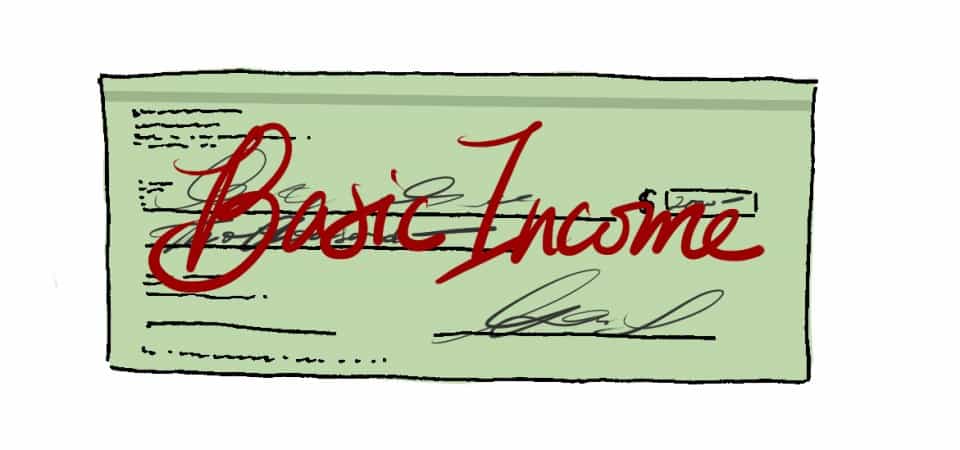[dropcap]In[/dropcap] 1774, an English rope maker named Thomas Paine moved to colonial Philadelphia. Upon discovering fertile ground for political experiments, Paine set out to found a nation like none other.
One of Paine’s works, “Agrarian Justice,” proposed a grant of £15 paid to every man and woman upon reaching the age of majority (some $2000 in present day US currency), a sum to be dispersed universally and unconditionally. His vision never materialized, but the idea lives on to this day, embraced around the world by a loose network of activist groups arguing for a radical update to our conception of the welfare state. They, like Paine, consider the “basic income guarantee” a right of citizenship itself.
[pullquote-image]

Corals Zheng/THE VARSITY
[/pullquote-image]
The personal revenue revolution
Here in Canada, the Basic Income Canada Network (BICN) – a hodgepodge of municipal organizations – works to convince local politicians that a basic cost of living grant will do wonders for our collective quality of life. They reason that, given our nation’s material abundance, they reason, a reshuffling of federal tax and provincial welfare systems could present Canada’s poorest factions with opportunities the private sector will simply never offer. What’s more, they claim, the giveaway will preserve economic health rather than hamper it within the context of a capitalist system. After all, it is predicated on the notion that all people have an income, making them viable consumers.
Over the summer, I interviewed members of the BICN. They were all aware of — and had much to say in response to — arguments against a basic income. As they see it, these objections are why we aren’t all already getting our cheques in the mail. Arguments include that the grant would be too expensive, that the poor would be disinclined to seek work, that capital flight would pose a threat to market stability – none of which they say, according to empirical data from trial models run here and around the world, are legitimate. To them, all that’s left is the job of convincing both the public and Parliament that a basic income is good for everyone.
This, is where students come in. Two years ago, Queen’s University started their own basic income group under the impetus of professor emeritus Toni Pickard. Pickard says they’ve been struggling to convince the Queen’s community of basic income’s benefits. The intuitive resistance, she tells me, often takes the shape of mistrust in the plan’s viability where production and fairness are concerned. Yet Pickard insists that studies defy these objections. “It’s just poor bashing, that’s all,” she tells me.
One of the most promising trials Pickard refers to took place in Manitoba between 1974-1979. Dubbed “mincome,” both the federal and provincial government funded a grant totalling $16,000 per individual in today’s dollar, handed out to everyone regardless of prior standing or occupation. A family of two received a little over $20,000. Yet despite the giveaway, people didn’t stop going to work – the local economy, rather than suffering, remained stable. The mincome grant provided a solid basis for the economy to flourish, as it established a populace with purchasing power. But the experiment ended, and no large-scale model was ever implemented.
[pullquote-image]

Corals Zheng/THE VARSITY
[/pullquote-image]
A future worth fighting for
Of all the activists I’ve spoken with in the last few months, not one has shrugged off my mention of student involvement. On the contrary, they stress that students’ voices are the most likely to make a difference.
“If a student group forms under the banner of basic income and begins putting pressure on the political class…that’s how you move forward, and that’s how it’s going to happen,” says Jon Sanderson, founder of Basic Income Toronto, a local group affiliated with the BICN. “But right now it is really just voices in the wilderness. A student group is going to have so much more power.”
According to Sanderson and his colleagues, the push for basic income will have to come from the ground up – campus groups, community rallies, and letters to the councillors in our own wards could make an impact. And as students, he says, we ought to have the greatest interest in turning the concept into public policy. It’s our future, after all, that a basic income can fortify.
The world we’re graduating into is one defined by precarious work and increasing job automation. Nearly half of all paid positions in Toronto — 44 per cent and rising — don’t offer steady hours, a living wage, or anything resembling job security, according to a 2015 study by the United Way and McMaster University on precarious employment. Furthermore, increasing job automation only looks to amplify precarious work and the problem of insufficient income. A recent cover article in The Atlantic bemoaned a projection that in 20 years’ time, robots and computer programs will fill just under half of all existing American posts. These challenges, say basic income advocates, necessitate a closer look at how we disperse wealth in this country, and will mean substantial systemic overhaul, something we ought to be starting now, before the situation worsens. But even in the face of these more obvious difficulties, one of the most daunting hurdles for a national basic income policy involves the idea of merit, or lack thereof.
[pullquote-image] [/pullquote-image]
[/pullquote-image]
Redefining work to work for us
In Paine’s day, “shot drill” was a common form of exercise for military prisoners. It involved forcing convicts to pick up a lead ball, often weighing thirty pounds, and carry it some distance to a dropping point – only to pick it up and bring it back again. Work was done simply for the sake of work. Prisoners didn’t deserve to be fed and sheltered, held the reigning belief, without giving up their time in return. Likewise, today, those opposed to a basic income often decry the unemployed for laziness and incompetence, claiming that handing out free money will only burden the hardworking and perpetuate undeserved entitlement.
Rejecting this concept remains at the core of the income revolution. Rather than measuring time in billable hours, we might begin to see it as a treasure better spent in meaningful pursuits, including unpaid labour such as caring for infants or the elderly. “To me the use of the word ‘work’ is an abomination,” says Sheila Regehr, chairperson for the BICN. “People don’t reduce their effort [upon receiving a basic income]. What the studies show is they trade paid work for other kinds of valuable work. So the trade off is not ‘shall I sleep an extra morning instead of going to work?’ the trade off is “shall I spend some more time raising my own kids? Shall I spend some more time going to school and learning a new skill?’ It’s not laziness. It’s just not that.”
[pullquote-image]

Corals Zheng/THE VARSITY
[/pullquote-image]
Following Paine’s theoretical vein, redefining the idea of material rights itself may be integral to the success of the movement. And as basic income supporters would remind us, universities have always been hotbeds of ideological transformation. Igniting change, they warn, requires our particular spark.


